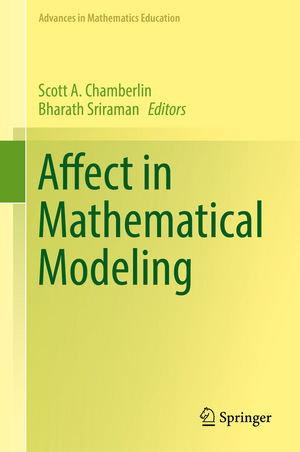Affect in Mathematical Modeling: Advances in Mathematics Education
Editat de Scott A. Chamberlin, Bharath Sriramanen Limba Engleză Hardback – 17 iun 2019
Din seria Advances in Mathematics Education
- 15%
 Preț: 648.24 lei
Preț: 648.24 lei - 18%
 Preț: 905.06 lei
Preț: 905.06 lei - 15%
 Preț: 660.04 lei
Preț: 660.04 lei - 18%
 Preț: 959.98 lei
Preț: 959.98 lei - 15%
 Preț: 642.51 lei
Preț: 642.51 lei - 15%
 Preț: 661.97 lei
Preț: 661.97 lei - 15%
 Preț: 657.57 lei
Preț: 657.57 lei - 24%
 Preț: 1337.45 lei
Preț: 1337.45 lei - 20%
 Preț: 581.64 lei
Preț: 581.64 lei - 15%
 Preț: 665.58 lei
Preț: 665.58 lei - 15%
 Preț: 653.14 lei
Preț: 653.14 lei - 24%
 Preț: 647.52 lei
Preț: 647.52 lei - 18%
 Preț: 1127.28 lei
Preț: 1127.28 lei - 18%
 Preț: 1129.02 lei
Preț: 1129.02 lei - 15%
 Preț: 656.89 lei
Preț: 656.89 lei - 18%
 Preț: 786.04 lei
Preț: 786.04 lei - 18%
 Preț: 1024.53 lei
Preț: 1024.53 lei - 15%
 Preț: 656.43 lei
Preț: 656.43 lei - 18%
 Preț: 1134.06 lei
Preț: 1134.06 lei - 24%
 Preț: 842.56 lei
Preț: 842.56 lei - 18%
 Preț: 957.62 lei
Preț: 957.62 lei - 24%
 Preț: 991.36 lei
Preț: 991.36 lei - 18%
 Preț: 950.33 lei
Preț: 950.33 lei - 18%
 Preț: 1009.54 lei
Preț: 1009.54 lei - 18%
 Preț: 1013.96 lei
Preț: 1013.96 lei - 24%
 Preț: 790.70 lei
Preț: 790.70 lei - 24%
 Preț: 797.37 lei
Preț: 797.37 lei
Preț: 898.26 lei
Preț vechi: 1095.44 lei
-18% Nou
Puncte Express: 1347
Preț estimativ în valută:
171.88€ • 179.94$ • 142.22£
171.88€ • 179.94$ • 142.22£
Carte tipărită la comandă
Livrare economică 05-19 aprilie
Preluare comenzi: 021 569.72.76
Specificații
ISBN-13: 9783030044312
ISBN-10: 3030044319
Pagini: 290
Ilustrații: VI, 332 p. 46 illus., 23 illus. in color.
Dimensiuni: 155 x 235 mm
Greutate: 0.65 kg
Ediția:1st ed. 2019
Editura: Springer International Publishing
Colecția Springer
Seria Advances in Mathematics Education
Locul publicării:Cham, Switzerland
ISBN-10: 3030044319
Pagini: 290
Ilustrații: VI, 332 p. 46 illus., 23 illus. in color.
Dimensiuni: 155 x 235 mm
Greutate: 0.65 kg
Ediția:1st ed. 2019
Editura: Springer International Publishing
Colecția Springer
Seria Advances in Mathematics Education
Locul publicării:Cham, Switzerland
Cuprins
Section I.- Commentary: Commentary on Affect, Cognition and Metacognition in Mathematical Modelling .- Chapter 1: The construct of affect in mathematical modelling.- Chapter 2: Metacognition in mathematical modelling-an overview.- Chapter 3: Principles for designing research settings to study spontaneous metacognitive activity.- Chapter 4: Engagement structures and the development of mathematical ideas.- Commentary: The what and why of modeling.- Commentary: Engaging students in mathematical modeling: Themes and issues.- Chapter 5: Exploring a conative perspective on mathematical engagement.- Chapter 6: Exploring teachers’ epistemic beliefs and emotions in inquiry-based teaching of mathematics.- Chapter 7: Mathematics learning experiences: The practice of happiness and the happiness of practice.- Chapter 8: Development of modelling routines and its relation to identity construction.- Commentary: Commentary on section III: Connections to theory and practice.- Chapter 9: Flow and mathematical modelling: Issues of balance.- Chapter 10: The complex relationship between mathematical modelling and attitude towards mathematics.- Chapter 11: Teaching modeling problems and its effects on students’ engagement and attitude toward mathematics.- Chapter 12: Affect and mathematical modelling assessment-A case study on students’ experience of challenge and flow during a compulsory mathematical modelling task by engineering students.- Chapter 13: Flow and Modelling.- Chapter 14: A coda on affect.
Notă biografică
Scott A. Chamberlin is a professor in the School of Education at the University of Wyoming. His research interests include affect, creativity, and mathematical modeling.
Bharath Sriraman is a Professor of Mathematics at the University of Montana.
Bharath Sriraman is a Professor of Mathematics at the University of Montana.
Textul de pe ultima copertă
In the book, the relationship between affect and modeling is discussed because, as educational psychologists have suggested for decades, affect directly influences achievement. Moreover, given the importance of mathematical modeling and the applications to high level mathematics, it provides the field of mathematics psychology with insight regarding affect, in relation to mathematical modeling. By doing so it helps determine the degree to which understanding of mathematics and understanding affect in mathematical modeling episodes may have a direct effect on cognition.
Caracteristici
Re-visits terminology used nearly 200 years ago by Pinel Helps readers develop understanding of the relationship between affect and mathematical modelling from an international perspective Provides insight on affective states while problem solvers create mathematical models
